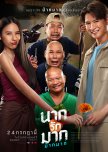
Sweet riff on Mae Nak
You will get more from this if you've seen Nang Nak first - the 1999 film is the clearest, most straight forward, classic retelling of the Mae Nak legend available on the internet. The more familiar you are with that story, the easier this one will be to follow and the more its emotions will resonate.Mae Nak has an important enough place in Thai culture that they make films about making films about her story - any way to revisit Nak, Mak and their love. There are dozens of adaptations and it's quite naturally assumed the audience knows the core story already. If you're only here for Krist, or only think about Thailand in terms of BL, can you not spare a couple of hours to learn more about this facet of their rich and complex culture?
My ratings and the rest of my review are provisional until I'm able to watch this subbed. I know I didn't catch a lot of the banter between the filmmaker characters but for the rest it was easy enough to go on vibes, visual recognition of elements from Nang Nak and what Thai I could pick up. Fern Passakorn as Salee was a favourite - I always like the energy she brings.
It's a sweet riff on Mae Nak. There's a lot of fun, plenty of silliness and of course a lot of love. Perhaps some brief commentary on the constraints fans put on actors' personal lives and loves. On its own, the love story between the leads may feel underdeveloped - but this isn't meant to be watched on its own. It's a recent addition to a long lineage of story.
If you short yourself on that background, you're shorting yourself on the emotions this one conveys. The choice is yours.
Was this review helpful to you?
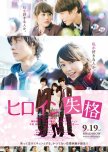
This review may contain spoilers
intelligent coming of age
This begins with exaggerated parody of characters and tropes but develops into real growth for all four. It's clever how they did that. Worth careful attention.The Japanese style of loud, physical comedy isn't for everyone. I'm not a big fan but through all of this, I could recognise and appreciate the skill and craft which went into it. If it had continued throughout, I might have thought 'not for me' but wouldn't rate it down - they executed a particular style very well. Moments in it had me laughing out loud too.
More importantly, it set up the female lead and the silly situation she'd gotten herself into well. And there were brilliant moments in there, like when she imagined herself standing up to the bullies but didn't actually say anything out loud.
Through it all, they wove in a lot of truths. You do need to speak up, Hatori was in love with her infatuation and Rita was dependent on her devotion. But through a tropey string of events, they did grow and come to love each other in a significant way. That's the heart of the movie - young people growing and figuring themselves out with each other's help.
There are tropes in there I'm not keen on - the claim that love 'doesn't need reasons' (emotions don't, but relationships do), or choosing the boy who keeps hurting you over the one who lifts you up. But both of those are more grounded than we usually see in rom coms. The love they grow into makes sense, and they give time to showing both its deep roots and the relationship, young but real, it's growing into. Rita gets it together more convincingly than most MLs. He wasn't striking out from his pain, just withdrawn. He took her devotion for granted, not realising it until Kosuke pointed it out. He tried to do the right thing in a situation where someone was going to get hurt whatever he did.
Adachi grows too. Her big scene, that was so well written. If you doubt the intelligence of this film, look there. Kosuke got some growth as well, though he already had a head start on the others.
And yeah, it would be great if sometimes the happily ever after wasn't the 1st leads together. This one though, they convinced me. Kosuke and Adachi are going to be alright as well.
For all of their skill with the over the top comedic exaggeration, for me it was the quiet moments where everyone shone. This is well done, there are layers and it needs attention to keep up as it shifts. Japan is amongst the best for intelligent coming of age, this is part of that tradition.
Was this review helpful to you?
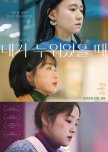
Parts of their stories are shortened through dialogue, but the conversations are grounded in everything else. The kind you might have with a friend or a sister after you overhear a phone conversation or something happens. The framework which makes this all work is well-constructed.
Together, it's a film about women's experiences in So Korea. The men don't come off well - it's also a film about toxic masculinity and the ways men bully women, abuse positions of power, or just don't get it. In one storyline, it's also about the ways men bully other men and perpetuate those patterns.
All of that fits with what I've read and heard about sexism and social pressure in So Korea. It's a bit of reality in the face of endless lovely handsome oppa series.
It's not a bleak film however. The end feels a bit out of place but I can understand why. It told its stories and it was time to wrap things up. All that was left to say was the words of three women, supporting and looking out for each other.
Was this review helpful to you?
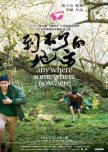
It's not a romance, gay or otherwise. The main character is gay, his friend and traveling companion takes his shirt off a lot. You can read tension or not. But it's primarily a film about coming to terms with complicated fathers.
It's not sentimental but it is full of emotion and there's a touch of melodrama in the music at times. It's like life, the narrative isn't always linear. I liked that, and how it conveyed the fragmentary nature of memories, how they arise and fade away, fitting themselves around whatever is going on in the present.
The travel part of the film feels very local in the beginning, and I feel like there must have been significances I don't have enough background knowledge to get all of. But the film is beautifully shot and so much of the countryside is gorgeous. Along the way they meet some lovely people too.
This won't be for everyone, but if you're open to following where it takes you, it's so good.
Was this review helpful to you?

slice of life done as ensemble theatre
The beginning of the film is several vignettes introducing the seven main characters, difficulties in their lives and connections between them. Not understanding what was happening, or being aware that it wasn't conventional film-making, it initially felt disjointed to me until they all began to gather at the party.It will help to understand the second half as ensemble theatre, heightened in emotion by the camera's ability to show close facial expressions. 180 Degree Longitude Passes Through Us also did this, albeit with a very small cast.
It's slice of life - not everything is explained, nothing is resolved. It's a brief moment in the lives of these characters, individuals who are both themselves and representative of different aspects of gay life within Japan.
If you're open to seeing it this way, rather than conventional movie plotting and development, the ensemble work is excellent - writing, editing, cinematography and performances all coming together to create something which feels like it's approaching chaos but had to have been tightly organised to stay so clear.
(Interview indicates there was some improvisation - if it was in the group ensemble work, that's even more impressive. But it may have been in some of the smaller conversations.)
Was this review helpful to you?
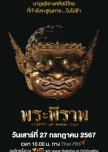
the highest form of Khon
Note: Ratings for this were difficult. I considered trying to rate it as a documentary, perhaps with an eye to MDL users who might watch a Thai PBS documentary on classical Thai dance. But respect for the tradition and practitioners is so strong a theme throughout, it feels most appropriate to give 10 for 'Cast' in acknowledgement of their proficiency and expertise, which then means 10s for Story and Music in respect for the tradition. Rewatch value? I’m sure I’ll get more from a second viewing.Thai PBS calls this documentary a ‘deep dive’. I’m not sure about that, perhaps ‘esoteric’ would be a better term (even, if I understand it accurately, within Thailand). There is a lot of information to take in - the beginning is especially dense with names and references to classical Hindu texts and beliefs and their Thai counterparts. Fortunately it slows down as it progresses and the names of Thai dance masters become familiar. Text accompanying the dance performance at the end helpfully summarise key points.
The English title is also somewhat misleading. I knew about Khon dance from Thai PBS’s one hour mini drama, "Dream a Little Dream", where a very determined young boy begins learning Khon dance, so I was hoping for more insight into that. "Dream" is an excellent and gentle introduction, by the way, with a sweet family story. Well worth an hour.
The Thai title of this documentary translates as “Documentary of the Pirap” - a very rare and specialised part of the dance tradition, considered to be the superlative form. Requirements for being allowed to inherit and perform the tradition are strict and complicated, only for those already ordained as monks and skilled in the arts - those with the knowledge are in their 70s and 80s and it’s in danger of being lost. So now my information is Beginners, Supreme Grand Master, and only a smattering in between. The quest continues to fill that in =D
The importance of religious beliefs in arts was what I found the most interesting here. “Arts in the world exist to praise or worship gods.” “Phra Pirap Nah Paht Dance is to invite the highest deity to help eliminate evil.” Phra Pirap is a fierce aspect of Shiva, capable of great protection.
Along the way, they also touch on the music, women dancers, and the making of masks. The masks are also religiously significant.
The last 13 minutes are a performance of the dance.
Was this review helpful to you?
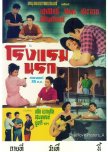
it's getting more crazy
I went in not knowing a thing about this so it was a steady stream of surprises and quite engaging. Some good use of music and shadows in the cinematography as well.Only my second 1950s Thai film so it was also interesting to learn a bit more about the history of Thai movie-making, like how many elements I'm familiar with from the last 25 years of Thai films were already there in 1957 and that an exaggerated kRap isn't a modern affectation from cheeky young men.
It's fun, it moves, there's a sense of freedom to it despite the single set, and in the end, the story it eventually finds its way into was good too.
Was this review helpful to you?
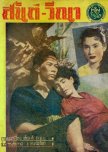
early gem of a film
The simplicity of this film is its strength, at least for me. I was right there with the main characters' emotions throughout, worried for them, hoping with them. Did help that I hadn't seen any synopses beforehand. Letterboxd's is particularly bad.It's a bit coming of age, a bit melodrama, a bit slice of life - religion, gossip, music, a school bully. Always aware of the prejudices someone with disabilities faces and how they impose additional, unnecessary obstacles. And of course it's a love story.
Some of the background music was a bit over done for me, but either that settled down or I got used to it along the way. Likewise the dubbed voices, especially for the children. But those were minor concerns. Santi's flute, the piphat ensemble, Buddhist chanting, effective use of silence too at key moments, all those mattered more.
And of course, Vina and Santi.
A restored version is available with subtitles on Film Archive Thailand's YT channel.
Was this review helpful to you?
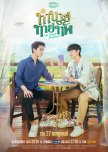
over-produced
I've been thinking about this a lot, trying to figure out why it really didn't work for me. I usually like slower paced and slice of life series. The Thai way of incorporating grief into a story without letting it overwhelm it is something I usually love.... So why am I so meh about this?It wasn't the cast, they did well enough with what they had to work with. But it's like a sparse handful of common cliches strung together with Meaningful Looks, some snogs and Inspirational sentiments taken from posters of sunshine, puppies and a cross. The setting was beautiful, the house was a dream, the kids were cute. But the villagers were more cliches. The attempted-murder mystery was so very weak and the motivations in it were very much why did they bother.
I did like the conversation with his father scene, but it felt unconnected with the rest.
All in all, it was over-produced. From most of the background music to the artificially white make-up shine to the soft focus lens to the cliched emotions. I could believe moments, but not the whole. Not even the romance arc.
It's also one where it's impossible to forget these are made as romantic fantasies for women. LGBTQ feels like such a misnomer in the tags. With the Christian quote and the very pale skin, I wonder if this one was perhaps made to chase the US audience in particular.
It wasn't bad enough to drop, especially as it's only 10 episodes. But other than the house and Khaohom's adorableness, there really isn't anything to draw me back or even remember. It was very undemanding and filled some time.
Those are my thoughts. Normally I wouldn't bother with a review for something like this, but I'm interested if others have similar reactions or their own insights. Please share yours in the comments.
Was this review helpful to you?
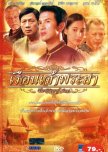
oh the melodrama
Algorithms surfaced this while I was searching for something else. With English subtitles no less. Not in the MDL database and almost no information on letterboxd, so the best way to decide if it was worth the time was to just watch it =DWas it worth it? There are better films. It's very melodramatic and feels like it belongs to an era far earlier than 2005. I was initially thinking 1950s, but now that I've seen a few from Film Archive Thailand's holdings, it's very different. What it most reminds me of in feel and tone is the 1959 Mae Nak Phra Khanong, although the only available version of that I've found has a very strange redub so perhaps the (unknown to me) redub date is a better comparison? It doesn't feel like anything I've seen from early 2000s Thailand so far, though I do have some leads for possible comparisons. Apologies for geeking out here. I enjoyed the sense of stepping back in time, not just in the content but in the very style of film-making.
It's not long and it moves at a good clip. Lots of things happen even though there isn't all that much story or depth of characterisation. I like melodrama and learning new things, and found it entertaining, so all in all it was worth my time. Would it be worth yours? If you have a spare hour forty minutes and a curious mind, give it a go and find out =D
Was this review helpful to you?
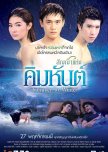
Be careful not to spoil yourself, just watch - lovely coming of age
Be careful about reading too much on the MDL page and go in knowing as little as you can. Do NOT look at the tags and be careful with the reviews and comments. I'll try to be vague enough here.The story at the heart of this is worth overlooking the disjointed writing and editing around it. My ratings are all for that, it's what I'll remember. Scenery is gorgeous (Turtle Island, off the shore of Surat Thani), the leads work well together, the central story is simple but heartfelt.
And yes, a few moments are missing/need to be filled in, while other bits are out of place with the rest. But that central story of the two young ones is lovely enough I don't care. If it were possible to give pixels a hug, I'd give this novice film one.
If you can find it (try GagaOOLala), just give it a go and watch it with your heart.
Was this review helpful to you?
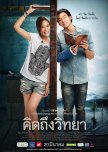
quietly perfect
10 stars across the board is usually the sign of someone a bit delulu and in the throes of an oxytocin rush after finishing a title. But honestly, I'm not going to take any of them away.Second time through and I love it every bit as much. The soundtrack is unobtrusive and right for each moment. The closing song (by 25 hours) has been on my repeat lately. Not going to link to it, save the video until you've seen the movie. And do watch the movie if it holds any interest for you. It's quietly excellent.
The story is great. It's not earth-shattering, but that's the point. It's told in that fantastic unrushed Thai way. There's humour, and heart. And kindness. So much kindness. Small cast, and they're all perfect for their roles, including the kids.
Seriously, why change a thing in this film? They got it exactly right.
Was this review helpful to you?

Educational comedy
As a short series, this is light, fun and engaging. The second episode repeats itself a bit much, though it does go quickly enough so it's more an observation than a real complaint. The end wasn't a surprise but I got it wrong on how they got there. Extra point for the oh right, of course misdirection.As informal educational material, it's excellent. Its lessons about several kinds of scams and what to watch out for are mixed with comedy and an engaging low-stakes plot capably delivered by the actors. There are moments where a viewer can pick up something (and get a boost from that), and others where not knowing is shared by some of the characters - it never puts anyone down for not knowing these things. I learned from the series too and also appreciated seeing things I'd only read about. It's the kind of television the cool kids I used to work with would pretend to scoff at - while paying close attention and giving themselves away with their laughter. That's valuable.
And around that, a pleasant wee series with engaging actors. I enjoyed it.
Was this review helpful to you?

needs a ghost
There's a sort of Thai movie I often adore - an unrushed two hours, with the first half or so exploring the wee world they've created before they start to reveal its poignancy. Add in a ghost and maybe it's about grief and loss. Not crowded or heavy in the way of many western films, but gently making space for those emotions and surrounding them in kindness and warmth.Love Stuck follows that general pattern - the set-up of two people wandering around the city showing each other cool things was perfect for that - but the delivery of its emotions in the latter half felt in your face and saccharine. Not the acting, that was fine. Or the way the Big Thing was telegraphed well in advance. But the music which was both cloying musically and had lyrics that spelled everything out - in English, granted, but it wasn't the way Thai production companies tend to use English lyrics. Some of the dialogue and other directorial choices. Thais usually do this sort of thing so much better.
I watched the US original to see if this remake was following its lead there. A few things really leapt out watching them back to back. One was how the early events they showed each other involved bad things happening to other people, which was commented on - "We really shouldn't laugh at other people's misfortunes" "But it is objectively hilarious" (they weren't). Does it say something about Thais and US Americans that the Thai remake chose to stay well clear of that? I'm an outsider looking in at both cultures so I don't know. Given how much else the movies had in common, it felt pertinent. Also the amount of casual destruction the US pair wreaked to amuse themselves.
Another bit I don't know what to make of is that while both wrote the young woman as the smarter/better in school of the pair, the US version included language like "Mark was right"/"I was wrong" from the young woman, with no reciprocity from the young man, and had the solution to their problem solved by his early input, information gathering and suggestion + her working alone to bring it about whereas the Thai handling let it be her smarts + them working together. There was more, including a bit in their romantic arc. All in all, her being smart was a threat to the man in the US version but not the Thai.
The music in the original wasn't so obvious about what we were supposed to feel but the beginning was more cynical. It's like they (Amazon execs? director and screenwriters?) just picked up the entire emotional arc of Love Stuck as a whole to move it away from the cynicism (that much is understandable for a Thai remake) even though it turned the second half poignancy to syrup. I'm at a loss for how else to explain or understand this. I've not seen anything from Thailand make its emotions so trite or saccharine. Perhaps the whys are US corporate execs looking to cash in on interest in Asian dramas? - the English language lyrics does suggest it was intended for a US audience.
Thai filmmakers and scriptwriters can handle emotion so well. Why they didn't in this, why it was more cloying and thus superficial than the US original feels very strange. From the other comments and some of the reviews, it works for many. But I can't recommend it. Not when there is so much better cinema from Thailand.
This needed a ghost - metaphorically - and the grounded, gentle Thai way of revealing the layers of emotions in this sort of story.
(Mid-level marks for "Story" because I had nowhere else to specify that my criticisms are about the way it was handled, rather than the plot itself.)
Was this review helpful to you?
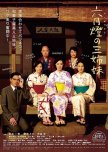
Pleasant slice of life
It's a pleasant wee movie where no one thing was explored in depth but a range of things around a theme were touched on.I think its intent is to make statements about women living by their own terms, but it's still immersed in a very patriarchal and male-centered society. As an outsider peeking in through their cinema, I don't know enough about feminism and sexism in Japan a decade ago to know if they were saying anything significant for the time and place. That divorce factors in so prominently probably is. I do think a theme is women defining themselves. It's just that their options are framed in terms of men.
The three sisters and their mother all embody different aspects of that. The relationships between the women are largely supportive, they're the glue connecting them rather than the focus of drama or narrative events.
The slice of life nature makes this work. It's a couple of weeks in the lives of an unconventional family. With a lovely Kagoshima lantern festival for more texture and beauty.
Was this review helpful to you?

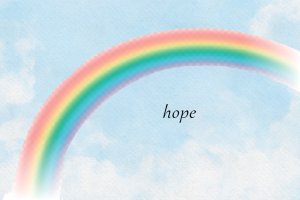
 1
1 4
4 1
1 1
1




















